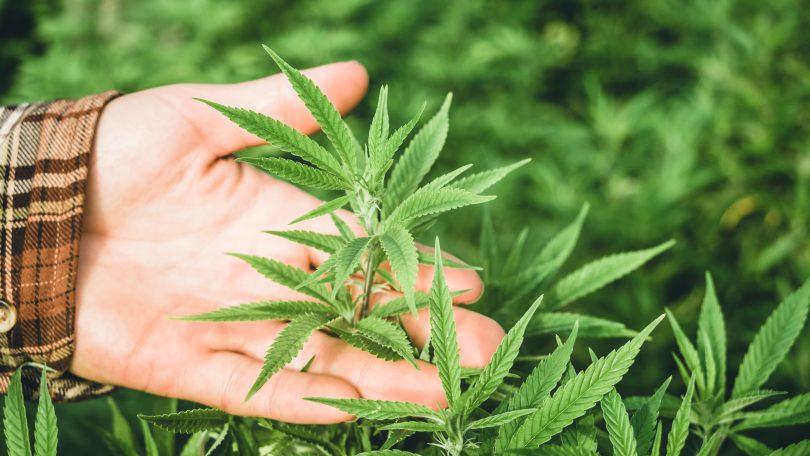In times of great economic disaster, nearly every industry takes a hit, and the CBD – and cannabis industry as a whole – is no different.
When we think about life, we generally think of what’s happening right now. The current governmental infrastructure in place, the current levels of technology, how our schools and transportation systems are set up, the stores we go to, and where we find what we need.
And, sure, we know that what’s happening right now does not reflect how it has always been, but just as change can often move in increments, and at a slow pace, it can also come in massive unexpected blasts that act as major disruptors, creating entire paradigm shifts. Think world wars, and the plague, Chernobyl, the great depression. Events or advances that so drastically changed the direction of people’s lives, that life as it was known before became irrelevant to the life created after.
Like going to the store for milk and having your car hit. All of a sudden, whatever the original goal was is no longer important, and whatever the plan was, well it has certainly changed. Whatever we thought anything was in the past several years, we’re likely to be looking at an entirely different world very soon.
Use the sign up form to subscribe to the CBD Business Weekly Newsletter
So, what is this threat that has nearly shut the world down?
Human coronaviruses, are a family of viruses that were first found in the 1960’s. One of the more well-known strains of it is severe acute respiratory syndrome (SARS). Human coronaviruses are known for causing respiratory infections, and while most coronaviruses are relatively mild, others, like SARS, can be more deadly.
The newest member of the family is Covid-19, which just entered the spotlight by storm, creating a massive worldwide panic, bigger than that caused by the much more deadly SARS epidemic not too long ago. Covid-19 made its first appearance in China in 2019, and like any communicable disease, it spreads through infected bodily fluids like saliva or mucus. Covid-19 does not rank anywhere near the top of the deadly virus spectrum, and does not seem able to cause the kind of mass death count as Spanish Flu (or a regular flu for that matter), ebola, the plague etc.
It has, however, created a greater hysteria than any of the previously mentioned – Right now there are about 500k cases – (which is rounded up), and about 7.7 billion people worldwide, which puts it at about .0064% of the global population. Spanish flu, for example, affected about 27% of the global population…just to put it in perspective.
Corona has generally mild symptoms akin to a standard flu with many people unsure they have the virus at all, and with most deaths attributed to the old and immunocompromised – much like the flu and many other illnesses as well.
Media-Fueled Hysteria
Hysteria, unfortunately, is not always about an actual threat, though it can create a threat by its very existence, which seems to be a notable threat with the current coronavirus epidemic. Of course, we need to be careful to not spread this to the more vulnerable among us, but the media has certainly done its part to create a mass hysteria, and many subsequent reactions that have their own negative impacts.
Sourcing Coronavirus Testing Kits, N95 Masks, Gloves & Hand Sanitizer
The hysteria has led to mass quarantines – some with the threat of military involvement, closed schools, good and supply shortages, borders shut down, flights nearly entirely grounded, halted work for millions upon millions of workers with issues of personal bankruptcies looming, smaller companies tanking, and the threat of entire economies bottoming out. This paradigm shift will affect nearly every industry in the end, and the CBD and legal cannabis industry is no different.
How coronavirus is affecting the CBD industry
There are different ways in which the current corona epidemic, and subsequent reactions, have been affecting the CBD and legal cannabis industry.
- Simple access is becoming a problem. In the US, for example, the laws about dispensaries staying open during a quarantine vary. This means that though it might be medicine to many people, if the decision in a location is to close dispensaries, sales will be greatly affected, and people will have to go without what they need. This is already happening in some locations. Some dispensaries have been servicing medicinal clients and trying to dissuade recreational clients from coming in at all to avoid crowds. It should be noted, however, that in the mass run for groceries and supplies, cannabis sales have gone up as people prepare for what could be a long quarantine. Also noteworthy is that most states have deemed cannabis dispensaries as “essential“, so many will be allowed to continue operating.
- As China is a major supplier to many other countries of cheap hardware used for cannabis production, and raw hemp material, the current situation creates quite a supply issue for those who have been depending on China’s products for their own businesses. China, as the original epicenter – and seeming originating location of the virus – has been stuck in its own tailspin with all kinds of business closures, and general slowing of many production processes.
- As a possible positive to the previous point, this hole left by China does open the door for local manufacturing to cover these gaps left by China. This could, in the long run, set industries up to be less reliant on China, and for local companies to take over these markets. This could end up bolstering domestic manufacturing, which could be a strong positive in many places.
- Another major issue hitting the cannabis market is the breaks in supply chains that have been occurring. This is a global industry, and often can’t function without the ability for a strong and resilient supply chain. Many countries – like Germany – with medical cannabis programs, rely on imported cannabis as they don’t grow as much as they supply to their customers. In fact, most of Germany’s cannabis is imported from Canada, Portugal, and Holland. A break in the ability to get materials from other countries can have a monumental effect on the industry. This is similar to the previously mentioned issues with China, which is another example of a break in the supply chain.
- Many industries have ground to a halt with all kinds of cancellations. The cannabis industry is no different. SXSW – not technically a cannabis industry event, but still one with a cannabis business track – was cancelled, the Hemp-CBD Supplement Congress which is run by the American Herbal Products Association is postponed indefinitely, and Berlin’s International Cannabis Business Conference was rescheduled for July. Denver’s FlyHi 420 Festival was cancelled. 420 Vancouver has been cancelled, and 420 Toronto was postponed, as well as Toronto’s O’Cannabiz. These are just a few of the global cannabis cancellations, many more can be found on this list. While these cancellations, like those of other industries, don’t mean a complete end to anything, it sure signals a massive slowing down, and all the problems therein.
- Another factor hurting the cannabis industry is the ability for companies to raise capital, especially in a time when entire companies are tanking and entire industries taking massive financial hits. The cannabis industry had already become very tight for finding funding, and this recent financial fallout has made it even harder. While some speculate that this could lead to investors being able to make cheap investments while things are down, as of right now the strain of it is being felt, and many smaller companies will likely not make it through.
Conclusion
Like with any other paradigm shift, there’s a certain amount of wait-and-see going on. The world has bounced back from other major calamities, so the idea that everything is done for is a bit dramatic. However, the expectation that things will go back to whatever status quo existed before, is likely just as off. The world will continue on, and so will the cannabis industry, but how exactly it will look, is something that remains to be seen.
Thank you for visiting CBDtesters.co. We’re happy to keep you updated on everything relevant in the CBD/legal cannabis industry. Check back frequently to stay up-to-date and make sure to subscribe to the CBD Business Weekly Newsletter for more articles like this one.







